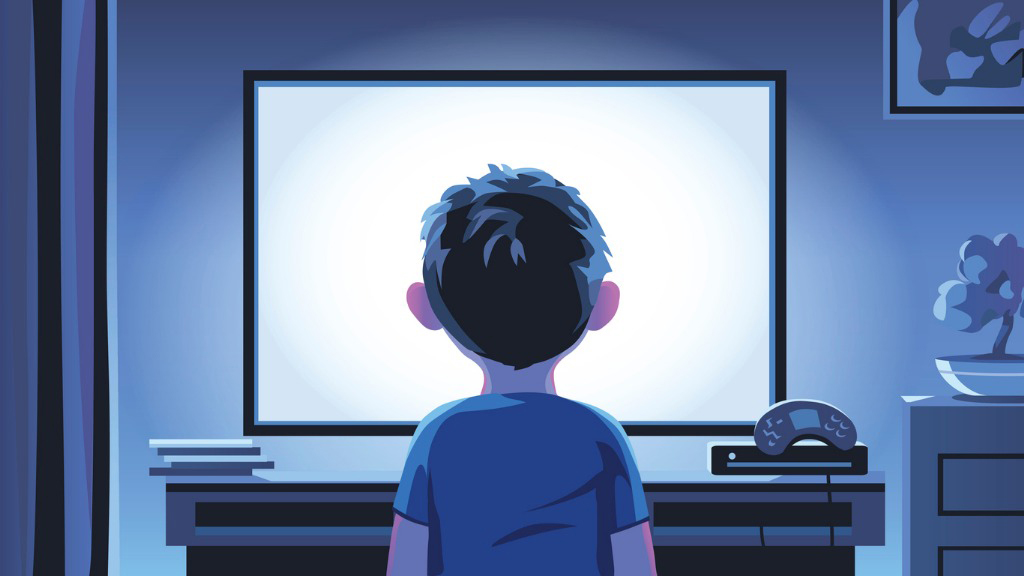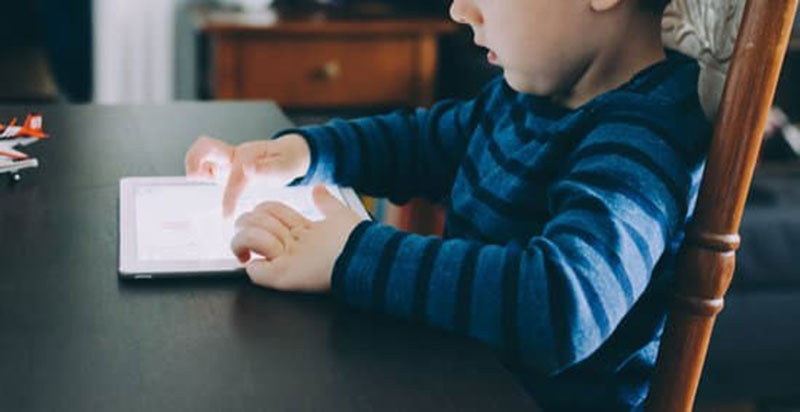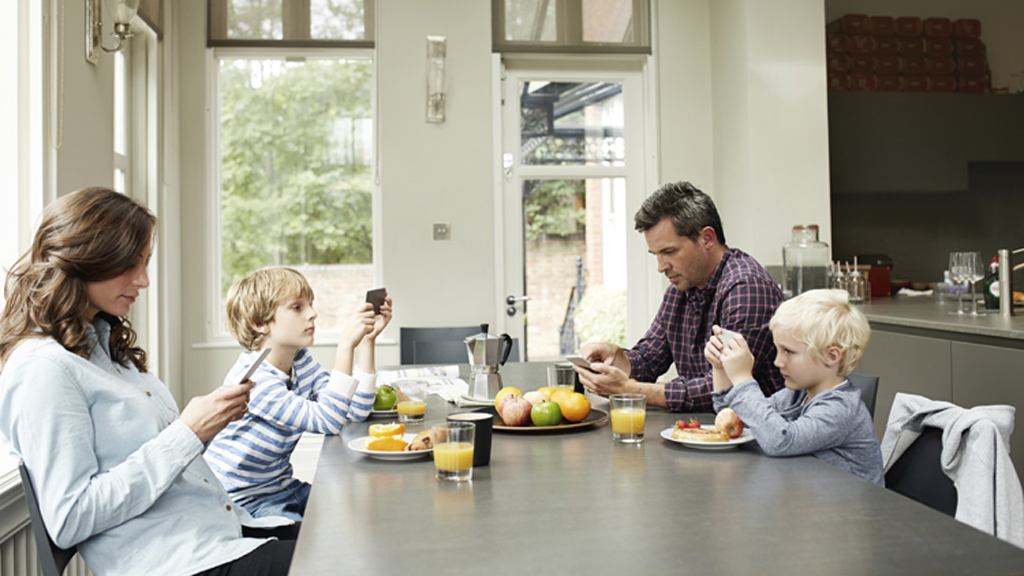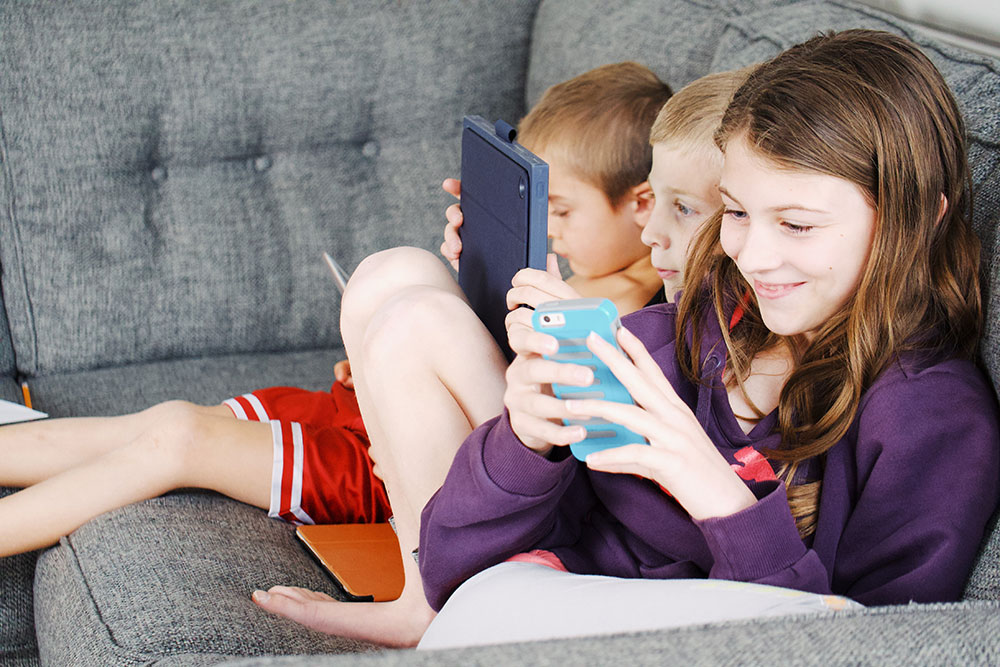I tried so hard to keep technology from taking over our home, but I have to confess – I have failed miserably.
In the early years I was vigilant and refused to buy devices. My eldest, George, was an avid reader, which I loved; you rarely found him without a book in his hand. We had a family joke that he could do anything with a book in one hand, and we have the pictures to prove it.
George was about eight the day a well-meaning neighbor offered him a Gameboy. She was lovely and respectful by asking me first if it was okay. I agreed, and that was our introduction to technology.
Someone then gave him a 3DS. Eventually he bought himself a Nintendo Switch and then a Virtual Reality headset. Besides these devices, he used the computer for his schoolwork. He also used the computer to hone his skills of animation and music making, both legitimate outlets for fun and learning when used with balance.
I could have stopped the train at any point, but I didn’t. Having said all this, the device isn’t the problem, and neither is he. I am.
It’s easy to blame the device or the kids but as a parent I’m the boss and have ultimate say about what my children can and cannot do.
Good-Bye TV

I thought I was doing well by getting rid of our TV when our eldest was a toddler. The television had become his go-to first thing in the morning. Rather than endure the constant battle and because I didn’t want the distraction myself, I thought we should get rid of it. My husband Brad, agreed.
When we moved to our first house we had a TV and the cable from the previous owners was still hooked up. I had never paid for cable in my life so enjoyed all the channels. At a certain point I realized that if we weren’t paying for cable we should call and let the cable company know so they could cut it off.
We called. Months went by and it was still hooked up. One day I noticed a cable guy working next door. I told him how we had asked the cable company to unhook us and nothing had happened. His response, “Enjoy.”
While I had his blessing, it still didn’t sit right with me. Eventually Brad and I concluded we would be better off without a TV, and we got rid of it. The joke then became that we were the only people in town who had cable and no TV.
At first I missed the television, but after a while I adapted. Now, 14 years later, I have lost all interest and rarely have the patience to even sit through a movie. The same can’t be said for the kids. We may not have television, but we have a computer screen, so on and on it goes.
Tablets, smart phones, televisions, and computers are easy babysitters so it’s not hard to understand how we got here.

Unlike George, who bought his own devices, I introduced our youngest son Josiah to technology. Josiah has Down syndrome and in a genuine attempt to enhance his learning we got him an iPad. It seemed like a good decision at the time. He has benefited from some of the learning programs, but some of his usage I consider a negative, not a positive. Once again, I am ultimately the one who grants or denies permission, so the fault is mine, not his, for any negative ramifications of this technology.
I’m not proud of admitting this, and truth be told it is something I would rather not expose. Like many parents, I struggle in this area.
When the boys were 8 and 11 we were part of a homeschool group called Classical Conversations. It was a great year of learning, fun, and friendships. At the end of the year, one of the moms put together a memory book with pictures and samples of the kids writing. Each child also wrote a short bio. George’s initial draft included his love of video games. My immediate response was, “What about reading? You love to read.”
I didn’t want his bio to list video games because quite frankly that made me feel like a failure. In the end some of his bio said that George “likes reading, making friends happy, and planning surprises …”
When the memory book finally came out, some of the other boys mentioned their love of Minecraft, but there was no mention of George’s love for the same. I don’t think I strictly forbid him mentioning video games, but he saw my displeasure and respectfully removed that line.
What About Me?
For the longest time I didn’t use a cell phone. I felt it was unnecessary and a waste of money. Just over two years ago, my mother-in-law died, and I inherited her phone. I didn’t use it much initially, but once I learned how to text and realized all of the conveniences of having a phone I was hooked. My phone has now become an appendage for me, just like it is for so many other people. Kids aren’t the only ones who have problems with technology.

A few years ago, while having dinner in a restaurant, a family in the next booth— mom, dad, and three children—spent their whole time on their devices. I felt so sad for them. Fast forward a few years and sometimes we’re that family. We still eat meals together but as soon as dinner is over each of us typically takes off to do our own thing which quite often involves a device.
At one time, I thought we were doing okay. Then gradually, without even realizing it was happening—we got to the place we are today. This didn’t happen to our family overnight. Each permission made it easier to grant the next.
To my eldest son’s credit, he has at times tried to address the problem himself by limiting his usage. And to my credit, thankfully, I have done a few things right along the way. I too have at times put limits on his usage but sadly, in both cases, these great resolves never seem to last.
It feels a bit hypocritical to say get off the computer, when I’m on the computer for long periods during the day. When I was writing my book, it was easy to justify time spent on the computer. After all, how else could I write my book? The book is written now, but I’m still on the computer daily because there are so many details that need my attention. There is always something, and there always will be.
I will decline posting stats on digital use for children and adults. We only need to look around and see babies in strollers playing with phones; children sitting in a room together, each silently playing on their own device; teenagers and adults filling every spare moment on their phone.
This is a killer to admit, but as the saying goes:
The first step in solving a problem is admitting there is one.
And the problem isn’t just out there. My father used to say that when you point your finger at someone else, three are pointing back at you.
I point at myself and ask: I contributed to this problem, now how can I fix it?

I can’t fix the problems of the world, but I do have a responsibility for myself and for my family.
My children are now teenagers, and my strong beginnings seem so long ago. It’s hard to compete with the lure of technology.
Technology is not going away, so it’s up to us as parents to learn how to help our kids manage it. It’s also up to us to manage it well ourselves.
I don’t want my kids to waste their lives in front of a screen, and I have no doubt that many reading this feel the same way.
If I could do it over again would I do things differently?
You bet I would. Hindsight is 20/20 but we can’t change the past. We do, however, have control over our actions today and tomorrow. I don’t want to beat myself up for the past, but I do want to make some changes now.
The purpose of this post is not to just gripe about the problem, but rather to encourage discussion since I am quite sure this problem is not mine alone.
How do you manage technology?
What has worked for you or your family? Please share your thoughts and experiences.
Or, perhaps you’re still at the stage of pulling out your hair asking, “How did I get here and what can I do?” Please share that too. I don’t want to be hanging out on a limb here all by myself. 🙂



Of course we have this problem too. The time limit thing works, sort of. For awhile.
It’s sad. We’re the first generation of parents dealing with this issue. None of us has answers, as far as I can tell.
We all want the best for our kids. If they had no cell phones, computers or other devices, would other kids even still relate to them?
I sure don’t have the answers. I just know they need to learn to navigate the world we’re actually in and I feel like I’m in a canoe with no paddle.
Thanks for your thoughts Kirstin, You are right that the kids need to learn to navigate well in this world. At the end of the day they need to learn how to make good decisions when we are not around.
Thank you for sharing! We are the first generation of parents to navigate this. I struggle with this issue daily and am always asking God for wisdom for me and for my kids. It is not easy but so important to continually watch and learn and be aware.
We talk a lot about the importance of face to face conversations and putting our phone away when people are around. We also have time limits set up with the plan and hope that eventually they will set their own limits. I’m always praying that my kids will love being with people and connecting. I also think it’s important to keep doors open when we are on devices to help with accountability. I use the Apple screen time and Circle to help with time limits.
With God’s wisdom and each other’s encouragement and accountability, we can train our children well in this area. Bless you, Denise!!!
Thanks so much, Hannah, for taking the time to share your thoughts. I appreciate hearing how you deal with this area in your home. This is a struggle that’s not going away, so each of us as parents needs to be vigilant. You are so right when you say that we need God’s wisdom and each other’s encouragement and accountability. Hearing your thoughts is an encouragement to me
Cara Denise,
Ovviamente questo problema esiste anche in Italia e nella mia famiglia. Io ho cercato di comprare il cellulare ai miei figli non prima dei 12 anni anche se tutti i loro amici gia’ ne possedevano. Personalmente cerco di dare delle regole di utilizzo e dei tempi. Per esempio a tavola no e quando siamo in compagnia no. Meglio guardarsi in faccia e parlare. In quedti ultimi mesi, durante l’emerfenza covid, ho imparato ad apprezzare la tecnologia, a non vederne solo gli aspetti di rischio e di pericolo. Ma anzi ritengo che la tecnologia ci sia venuta molto in aiuto, ci ha permesdo di continuare ad avere relazioni anche se a distanza, di continuare a lavorare e a studiare. Penso dunque che la cosa importante sia non demonizzare ma metterci al fianco dei nostri figli in modo da aiutarli a mettere senso, ad aiutarli a problematizzare, a farsi domande, ad usare la tecnologia in modo consapevole. Credo che questo sia il compito che l’adulto deve avere nei confronti dei giovani. Fondamentale e’ l’educazione digitale per tutti. Un abbraccio
Thank you so much for your thoughts Isabella. What you have said is excellent, I would like others to read this so I will do my best to translate.
Dear Denise
Obviously this problem also exists in Italy and in my family. I tried not to buy cell phones for my children until they were 12 years old, even though all of their friends had them. Personally I try to make rules for usage and times. For example, not at the table or when we are in the company of others. It’s better to look at one another in the face when we speak. In the last few months, during the Covid emergency I learned to appreciate technology and not to just look at the risks and dangers. But rather, I believe that technology has been a help and has permitted us to continue to have relationships even though at a distance, we continue to work and study. I think therefore that the important thing is not to demonize but to place ourselves beside our children to help them make sense and to problem solve and ask themselves questions about how to use technology in a conscious way. I believe that this is the job that adults should have when it comes to young people. Digital education is really for everyone. A hug.
You are definitely not alone. I can remember telling a friend I was very happy with my Nokia brick phone but when she got a new smart phone she passed her old one on to me. I’ve been lucky in that my boys have such busy schedules in a heavily discounted private school with huge sport involvements that take up a lot of their time. Unfortunately with Covid, sport has almost stopped. Our younger 2 are 16 & 19 and our older 2 are 26 & 29 and I have certainly seen the difference in parenting in that 8-10 year time frame. I don’t have a lot of advice or solutions but it is an ongoing challenge with positives and negatives (wouldn’t be able to read your blog without it). I think it’s been harder for me lately because the Covid slow down has meant I’ve had more time but that time is too often spent reading articles about the world-wide chaos. It’s good to keep re-evaluating what we’re doing and remember as parents to model for our kids and give good reasons for our suggestions in regard to use.
Thanks Amy, I think your last sentence is key: “It’s good to keep re-evaluating what we’re doing and remember as parents to model for our kids and give good reasons for our suggestions in regard to use.”